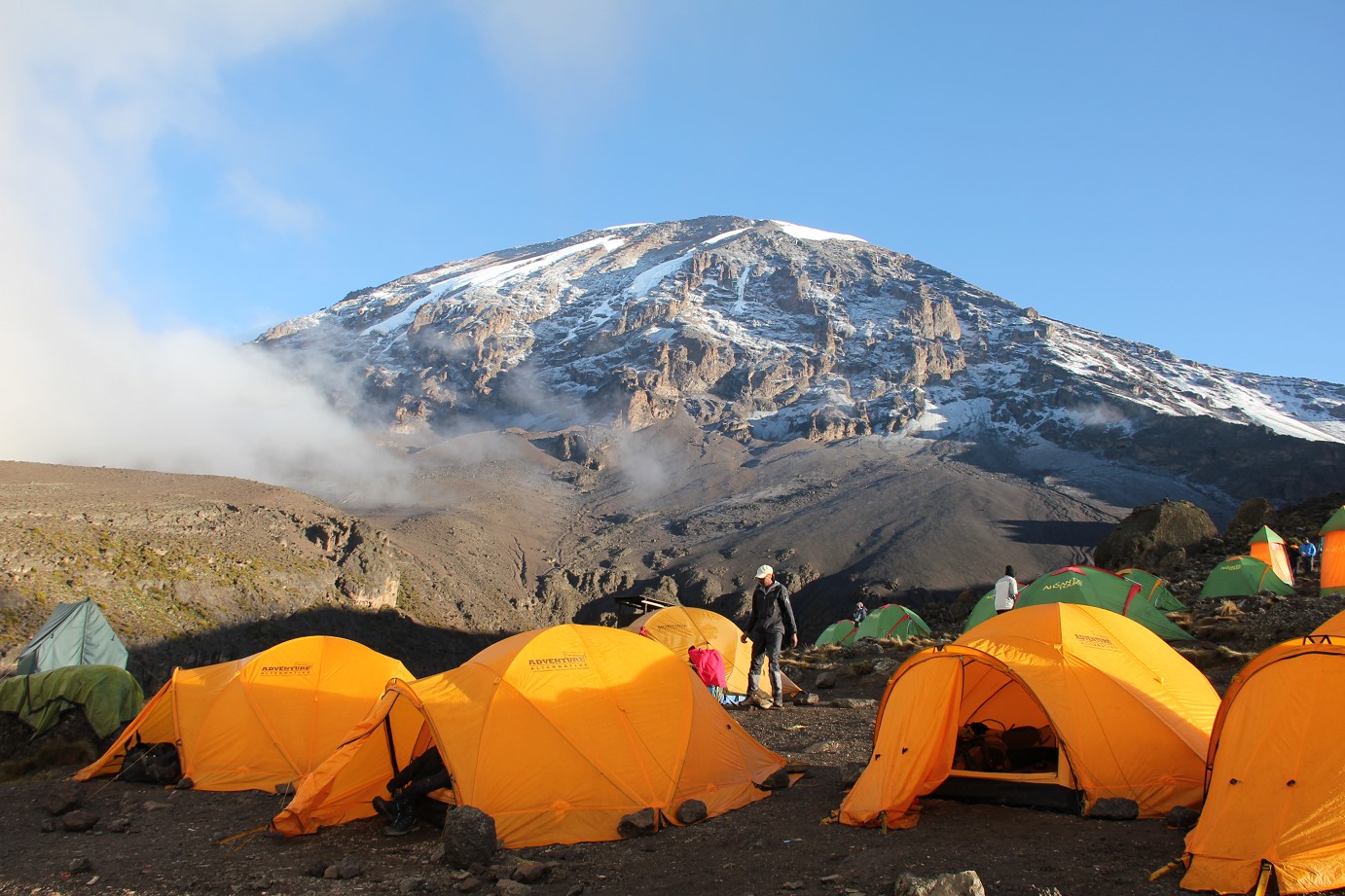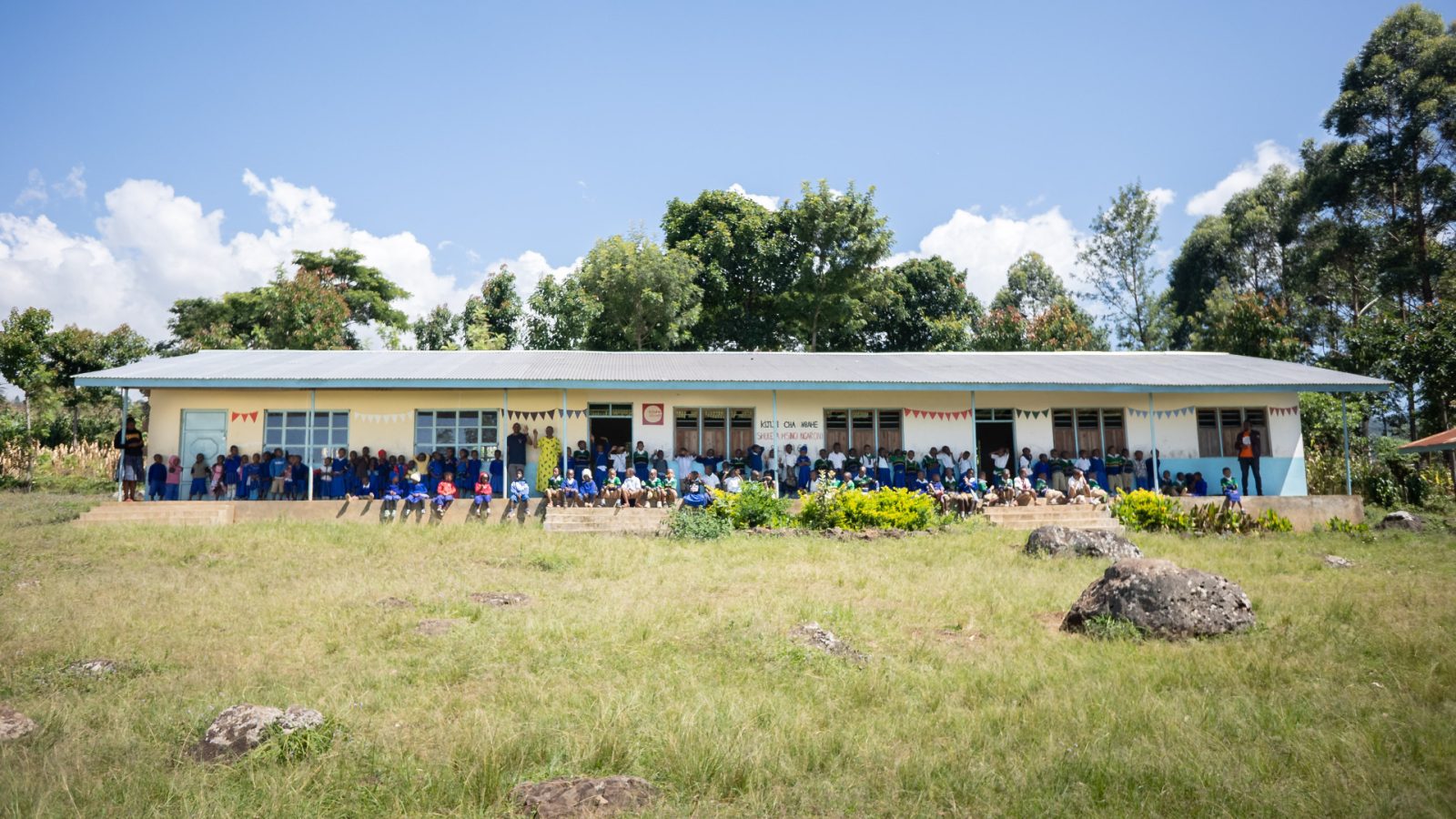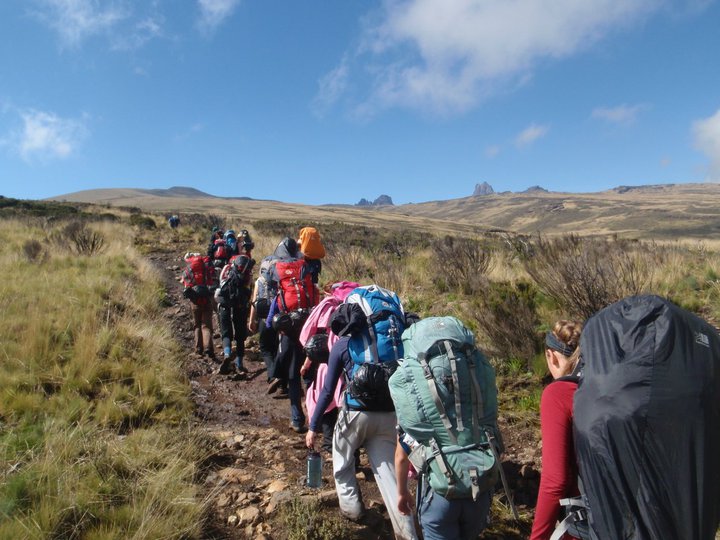
Tanzania School Expedition
Our Kenya school programme has been so successful that it has grown and developed into Tanzania since 2013. The location is Marangu village on the slopes of Mount Kilimanjaro, an area which has seen many changes as the climate change on the mountain has changed the geography of the land. We started with a plan to renovate and rebuild schools in the villages because the local people were having to send their children every day to Moshi, a bus journey of forty minutes which was costing too much.
Overview
Our Kenya school programme has been so successful that it has grown and developed into Tanzania since 2013. The location is Marangu village on the slopes of Mount Kilimanjaro, an area which has seen many changes as the climate change on the mountain has changed the geography of the land. We started with a plan to renovate and rebuild schools in the villages because the local people were having to send their children every day to Moshi, a bus journey of forty minutes which was costing too much.
This area is also where we employ many people with our climbs on Kilimanjaro and Mount Meru, so it is appropriate that this school expedition includes a climb of Mount Meru, a great ascent in wild country but not at all technical.
Just like the trip in Kenya, this expedition has the hallmarks of travel and culture and adventure, combined with service to the community and interaction with the local people. We are particularly proud that this entire trip has been put together and organised by the staff in Kenya, who have had years of experience running similar trips in their own country.
Africamp Student Expedition in Tanzania
Here is a great video made by a young student from Writhlington school near Bath about his trip to Tanzania, and it captures the essence of the trip really well.
The project which is determined by Moving Mountains is at Ng’aroni Primary School in Tanzania, and our aim over the next five years is to create an excellent educational facility for up to 350 children, with an Early Child Development centre as well. This is a priority for the education authorities.
Tanzania School Expedition Itinerary
The itinerary is designed to give participants a great all round experience which mixes genuine charitable projects and a camp for local Tanzanian children who benefit directly from Moving Mountains, with an exciting overland adventure to explore some of the many National Parks and wilderness areas where they’ll face personal challenges and experience the diversity, culture and hospitality that Tanzania is famous for.
The first half of the trip is spent with our charity projects, following a tried and tested itinerary of organising and running a children’s camp while at the same time building and working on a Moving Mountains project, which is decided upon consultation with the local communities and committees that we work with. Over the years we have re-built or established a number of schools, a Rescue Centre for Street Children and our own Children’s Home and Community Village.
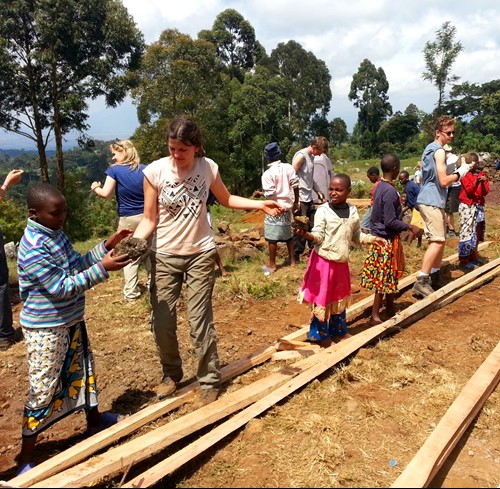
The next section is a climb of Mt Meru, which represents a personal challenge which requires determination and excellent teamwork. Mount Meru is an active volcano located 70 kilometres (44 miles) west of Mount Kilimanjaro. It reaches 4,566 metres (14,980 feet) in height but has lost much of its bulk due to an eastward volcanic blast about 8,000 years ago. Mount Meru has a spectacular ash cone in her centre that has formed in the old crater. She is the topographic centerpiece of Arusha National Park whose fertile slopes rise above the surrounding savanna and support a forest that hosts diverse wildlife, including nearly 400 species of birds, and also monkeys and leopards.
Following the hard work of the camp and the climb we then have a few days to relax and reflect as we journey into one of Tanzania’s great open reserves where we’ll be looking to see the wildlife that the region is so famous for.
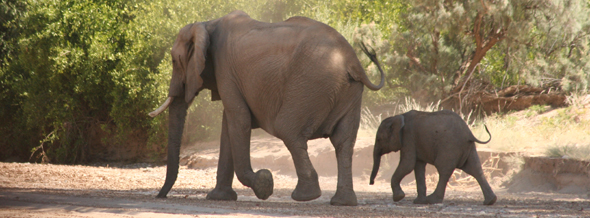
Arrive into Kilimanjaro Airport, to be met by Adventure Alternative staff and Moving Mountains representatives. Transfer to our camp in the town of Moshi. Settle in and have welcome introductions and briefings.
Travel to the location of your volunteering and international development project and settle in to camp there. Here you will meet local community representatives, who along with the Moving Mountains representatives will introduce you to the area and brief you on the nature and significance of the project.
You will camp in the heart of the local community and interact with the local people, including local students and school children. You will collaborate on the development project and be fully immersed in rural east African life.
At the close of the camp and project there will be a celebration and ceremony to allow everyone to enjoy the sense of achievement and to share their thanks. We will then travel back to the camp in the town of Moshi.
Following on from ongoing training throughout the project camp, today will be a final day of briefings and preparation ready for the climb of Mount Meru.
After breakfast we usually depart Moshi at about 8:30am to travel west below the south face of Kilimanjaro to its sister, Mount Meru and the Amboseli National Park entrance at Momella gate. Here we meet our team and start the climb with a picnic lunch then a trek up through the rich Afro-Montane forest to the first hut called Miriakamaba hut. We have dinner and stay overnight in the Miriakamba hut where we have dormitory bunk beds.
After breakfast we will begin the climb through the Alpine Heath to the second hut called the Saddle. This is a steeper climb compared to yesterday and usually takes about 3hrs. We are gaining quite a lot of altitude and we will definitely feel it’s energy-sapping effects. During the afternoon, we also have the option to climb little Meru peak which takes about an hour. Alternatively we will just take it easy and relax, hydrate and acclimitise. Dinner and overnight will be in the Saddle hut with dormitory bunk beds again.
Wake up at mid-night and have a cup of tea and some snacks before starting our attempt of the main Meru peak. We will proceed to the summit via a rocky path around the spectacular rim of the collapsed crater. From up here it is easy to see the origin or Mt Meru as a volcanic cone with one side of it blown out to leave a spectacular crescent-shaped ridge with a vertical cliff on one side, plunging down to the crater and volcanic ash-cone below. After enjoying the views we will descend back down to the Saddle Hut for a full breakfast. The rest of the day will be spent resting and generally enjoying our location. Lunch, dinner and overnight will again be at the Saddle hut.
This morning we leave the Saddle hut and descend down to Momella gate via our first hut (Miriakamba). At the gate we will jump into our vehicles for the drive back to Moshi and a well deserved shower!
After our exertions on Mount Meru we now travel to the village of Mto wa Mbu, close to the entrance gate of Lake Manyara National Park. Here we will take a well earned rest by the pool at the Twiga Lodge Resort.
Today we go on a game drive in Tarangire which is Tanzania’s sixth largest national park. It is the vast number of baobabs that first capture the eye as you enter Tarangire National Park. The gently rolling countryside is dotted with these majestic trees, which seem to dwarf the animals that feed beneath them. Lake Burungi area is in the north-western part of the park and a tour drive in this area will offer you fascinating opportunities to watch large herds of flamingos and other species of birds feeding on aquatic organisms in Lake Burungi. This area also contains an isolated population of Oryx, Wildebeast, Lions, Elephant, Rhino, Gazelle, Cheetah, Buffalo, Warthog, hartebeest, long-necked gerenuk, Impala, Zebra, Dik-dik, Leopard, Hyena and fringe-eared oryx. The swamps are the focus for 550 bird varieties, the most breeding species in one habitat anywhere in the world. Tarangire’s pythons climb trees, as do its lions and leopards, lounging in the branches where the fruit of the sausage tree disguises the twitch of a tail.
Today our safari takes us to Lake Manyara, described by Ernest Hemingway as the loveliest I had seen in Africa. Game-viewing circuit through Manyara offers a virtual microcosm of the Tanzanian safari experience. The entrance to the park is lush forest with many ancient mahogany trees and many monkeys. This then opens up to a large grassy flood plain and the lake itself with a stunning backdrop of jagged blue volcanic peaks that rise from the endless Maasai Steppes. Inland of the floodplain, a narrow belt of acacia woodland is the favoured haunt of Manyara’s legendary tree-climbing lions and impressively tusked elephants.
Today we pack up camp and make our way to Arusha where we can stop for some shopping or visits. Then onward to Moshi where we pitch our tents for the last time. Tonight we will enjoy a farewell meal with the team and reflect on everything we have done and experienced together over the last three weeks.
From Moshi we will transfer back across to Kilimanjaro airport for our international flight home.
Tanzania School Expedition Cost £1,595.00
Moving Mountains is not a tour operator so the charity outsources the management and logistics of the groups to the tour company Adventure Alternative. We do this as they are experts in their field and unlike MM, they are an officially recognised, licenced & bonded tour operator.
INCLUDES
- Adventure Alternative Tanzania and Kenya staffing and ground support
- Adventure Alternative UK expedition organisation
- All internal transport, airport transfers and travel
- All meals and bottled water
- Accommodation provided in safari tents (huts on Mt Meru)
- Guide and Porter support on Mount Meru
- Fees/Permits for Mount Meru
- All National Park fees for the safari
- All activities as per the itinerary
- Medical back-up from Interhealth
- Amref ‘Flying Doctor’ support
EXCLUDES
- Moving Mountains fundraising target – minimum of £500.00 per person
- International return flight to Kilimanjaro Int airport (or Nairobi airport and a shuttle across the border)
- Travel Insurance
- Tanzania Visa
- Travel vaccinations, anti-malaria tablets or medical costs
- Tips for Mountain Staff (~£30.00)
- Personal spending for souvenirs, snacks, etc
Fundraising for the charity section allows you to use sites like My Donate where you can set up a personal fundraising page to take advantage of the Gift Aid scheme. Gift Aid adds 25p to every £1 donation from a UK tax payer.
NB: The expedition fee, which is payable to Adventure Alternative cannot be paid using MyDonate or Justgiving.
Travel Insurance – you will need travel insurance for this trip, and normal holiday travel insurance is adequate as long as it covers trekking. We advise you to get this insurance early on, so that if you have to make a late cancellation for some reason then you will get all your money back.
Local Providers
Aside from the investment in Adventure Alternative Kenya & Adventure Alternative Tanzania who employs many former beneficiaries of MM, there are many more local providers who have benefitted from our model of responsible tourism, and they are small family run businesses like the local market sellers, the food producers, the cooks, building suppliers, brick makers, or local accommodations providers who all continues to develop and expand as a direct result of the business that is provided through you coming on a trip with us.
Tanzania School Expedition Kit List
The basic idea of your kit is to keep you warm, dry, protected from the sun/rain and comfortable in the various environments that we will find ourselves in.
There is a detailed kit list via the menu below-right and the main principles are:-
- BAGS – A duffel type bag for general use, a rucksack for carrying kit on the mountain and a small pack for carrying a few items on day trips
- GENERAL CLOTHING – Clothing for day to day travel, time on the camp & safari
- SHELL – Waterproof layer to keep off wind/rain
- INSULATION – Layered system to keep you warm on the mountain- body hands & head
- FEET – Day to day shoes, sturdy trekking boots, flip flops/sandals
- SLEEPING – Warm sleeping bag and camping mat to get a good nights sleep
- EATING/DRINKING – Water bottles and personal plate, bowl, mug & cutlery
- WASHING & MEDICAL – Suncream, anti-Malarials and a small 1st aid kit
Additional Kit Info:
- You will have to dress conservatively in the villages and in public in general. You will draw unnecessary attention to yourself and probably cause offence if revealing clothing is worn. Remember we are guests in a country and culture that is very different to ours, we need to be respectful guests.
- Make sure hiking boots fit well and that you have used them at least a few times before the trip to break them (and your feet) in.
- Clothing for the mountain needs to be synthetic and quick drying in case it rains. Make sure that you have a change of trekking trousers and base-layer top and something like a fleece top as well as a warm coat. It can be well below freezing at night and on at least the first half of summit day.
- Take a good warm sleeping bag of at least three seasons, and a good sleeping mat for insulation. A sleeping bag liner made out of cotton (or silk) is useful too and helps to keep the bag clean or can be slept in if it gets too hot. Make your own sleeping bag liner if you want from an old sheet sewn into a mummy shape. Don’t make it too tight around you though.
- You will be able to wash clothes – handwash in washing powder, that is, and local women will also offer to wash your clothes on the camp for a small charge. The problem can be trying to dry things, heavy cotton garments can take ages to dry where-as light synthetic ones dry very quickly. On the mountain there is no opportunity (or need) to wash clothes at all.
- Take old clothes to wear for the project and camp, they may get dirty or covered in cement or paint. You will want travel clothes which are clean for the travelling home bit, and maybe for the safari, but on the camp and project it may be pretty dirty. Choose your clothing based on usefulness and durability, not for fashion statements. Some clothes you may want to give away or swap at the end for souvenirs.
- If you wear contact lenses take plenty of saline and comfort drops- it can get dusty. And obviously have your glasses on hand as back up.
- Bringing your own mosquito nets are optional. The tents have inbuilt nets and people in the past have generally not had a big problem with insects.
- Do not bring porcelain plates – bring plastic and a few spare spoons – they always go missing. Make sure that plates and bowls are of a generous size so that you can fit the food in; you will be hungry!
- Keep your money somewhere safe, bum bags or body wallets can be useful. Do not bring large wads of notes with you. If you take sterling cash with you make sure they are good condition Bank of England notes, not regional notes, eg Northern Irish notes or Scottish notes.
- For the mountain, work on a layering system which gives you versatility – Synthetic base-layer tops or thermals, shirt or warm top, fleece, waterproofs. Gloves and hats are vital too.
Why Us?
This programme has successfully delivered a great and influential experience to thousands of young people since 1991, first in Kenya and now in Tanzania. The essential make-up of the trip is the same, and it’s still just as popular with students now as it was in the days before mobile phones and facebook. We have not diluted the adventurous nature of it and the whole experience of travelling to a new country and culture is as exciting now as it was back in the early 1990’s.
The safety aspect is unrivalled and wework with Adventure Alternative, the company that Gavin Bate started at the same time as Moving Mountains, which is an established tour operator that has all the proper insurances, policies, assessments, financial bonding, qualifications, experience, equipment, vehicles and staff to ensure a smooth and safe transition throughout the whole trip.
Moving Mountains ensures that the trips are not over commercialized, or marketing on young people’s desire to help others. We have serious developmental aims, well evidenced and documented over many years now, and we run this programme with an emphasis on the long term benefits.
Our partnerships with schools, communities, villages and the authorities span decades now; we are absolutely confident that this trip does not fall into the traps of short termism, or perpetuating damaging stereotypes of aid. Our experience is that this trip has only ever given all the young people involved a great adventure, lots of self esteem and lots of motivation to make something of themselves.
Climbing Mount Meru on the Tanzania School Expedition
This is a great adventure for everyone, not technical but with one short section near the summit that needs a bit of care and sometimes a handrail of rope if the rock is slippery. Lots of wildlife and camping all the way, standing on top of a Mount Meru is a real achievement, as this video shows very well!
Safari on the Tanzania School Adventure
Every trip to Africa has to have a safari and Tanzania has some of the finest parks on offer. We use our overland safari vehicles to enjoy the best that the land has to offer, an unforgettable holiday out on the plains of the southern Serengeti.
Fitness and Terrain
You do not need to be super-fit for this trip, however the expedition element is moderately demanding with some long days of sustained walking with a backpack. The effects of altitude will also further tax your body on the mountain, but just go slowly and rest and drink more than usual, and it will be challenging but not terrible.
On the project phase you will usually camp close to the main Marangu medical centre and walk up to the project each day. This is a beautiful walk through semi-tropical forests and past coffee and banana fields. It is a small path and can be a bit muddy after recent rain. It is a beautiful way to start the day and to get warmed up for the project work.
The terrain on Mt Meru varies throughout which leads to an interesting and ever changing environment. Durning the climb you will go from lowlands through equatorial forest and alpine heath, then across a lunar-like rocky landscape up to a rocky volcanic summit. Mt Meru’s position just below the equator offers an opportunity to experience extremely varied terrain and conditions, all in one expedition.
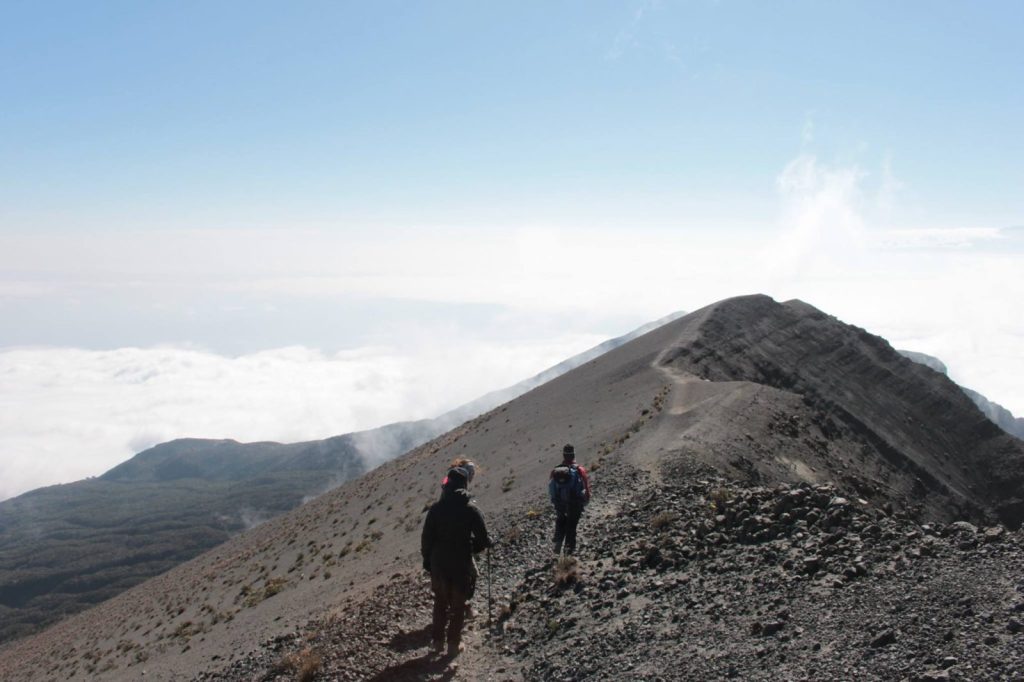
Climbing Mount Meru is not a technical climb and in essentially a walk all the way. There is no need to climb rock faces nor get close to precipitous drops along the way, no rock climbing or specialist equipment is needed. There is a short section close to the summit which involves a slightly exposed traverse over bare rock. There are steel rings in place and we will set a handrail rope if necessary. In exceptional circumstances where there is a lot of rain or snow it may not be safe to cross this part ad we may have to stop just short of the main summit and watch the sunrise from Cobra Point instead. The paths are in good condition and fairly well trodden with rangers stationed at each of the huts as well as on the trail generally.
During the safari part of your adventure, you will be entering reserves/parks usually consisting of dirt roads and sand tracks and not tarmac. If conditions are wet this can lead to adventurous driving but be assured that our drivers are well versed in safe and professional driving skills. If the weather is very dry then the terrain can be dusty so it’s worth bringing a shawl or light scarf to cover your mouth and nose. The vehicles are well maintained and professional safari vehicles. It is important to remember that you are in the animals environments and you are not top of the food chain!
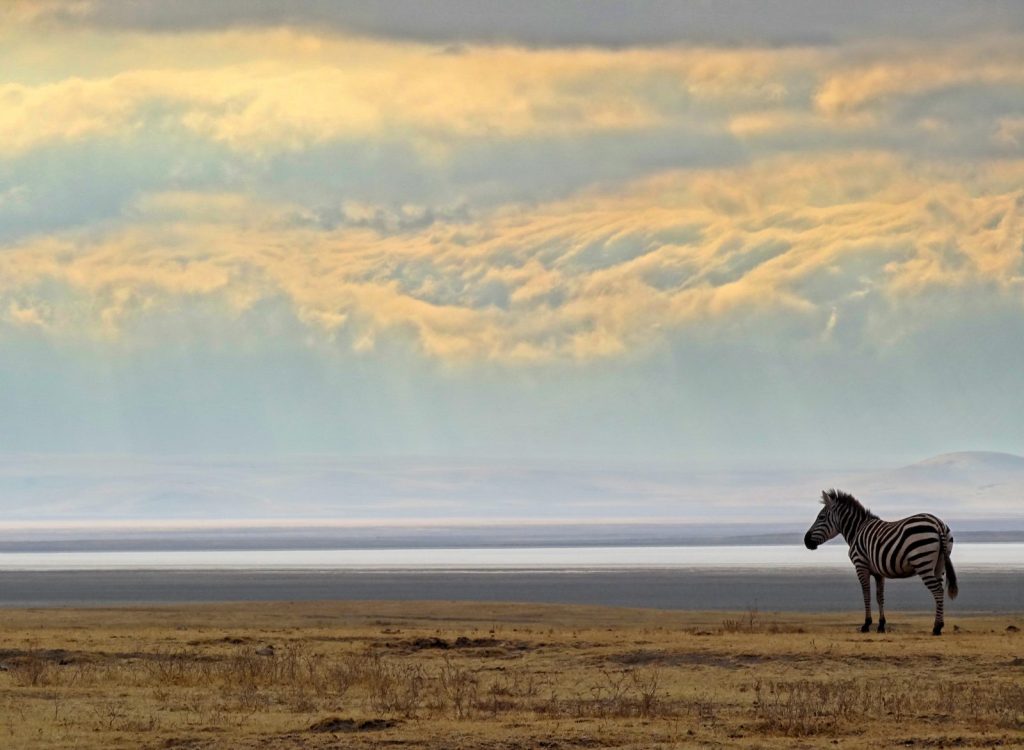
The Benefits of a Personal Development School Trip
Visiting Student
‘Personal Development through International Development’ is how we like to summarise the benefits for a young person on one of our trips. The experience, although managed with great care and with wonderful staff also allows the visitor to expand on skills they have and explore, use and develop new ones. Below are some areas which this trip gives a greater understanding or experience of to the visitor:
- Travel
- Global citizenship
- Cultural Awareness and interaction
- Understanding & experiencing (charity) development at a grass roots level
- Learning and using teaching, building and sports skills
- Language skills
- Time management
- Financial planning, awareness and management
- Fundraising initiatives, planning and management
- Resourcefulness
- Motivation
- Communication
- Discovery
- Exploration
- Geography
- Politics
- Sociology
- History
- Anthropology
- Self belief and confidence
- Drive, ambition and maturity
- Fitness & physical challenge
- Personal challenge
- Team work
- Organisation
- Catering and nutrition
- Practical skills
- Camping & trekking skills
- Wildlife knowledge and experience
- Problem solving
- Health and hygiene
- Safety and how to look after yourself whilst travelling
- Responsible Travel
TEACHERS / SUPPORT STAFF
Whether you’re physically with the group in East Africa, or have been the support behind them for fundraising at home, then there’s also benefits to you:
- All of the above benefits that you get to give to the students!
- Your own personal challenge
- Increased recognition in your school
- Professional development portfolio advancement
- Achievement of seeing the group reach & realise their goals
- Watching and helping the young people develop personally and socially
- Raise your school profile in terms of local media and within your education board
PARENTS
Despite being naturally concerned that your children will be away from home you can be assured that they are in good hands with a team of staff who will look after them really well. We often get calls from parents after the trip to tell us how their children have had such a positive experience. Below are a few of the remarks which are often made:
- They’ve matured
- Eyes opened to the real world
- Focused and more motivated at school
- Greater drive and aspirations for the future
- A desire to teach / work in the charity sector / help people
- Gained such good travel experience for when they travel again
- More confident
- Listens better
- Is nicer to their siblings & parents!
THE HOST COMMUNITY
The communities with which MM work, benefits greatly and often in ways that we don’t always appreciate. For example Mt. Maurice Odindo, head teacher at Wagwer Primary School thanked a group from the UK for the water pump that they’d paid for and installed with MM in his school. When he thanked them he explained that this water pump not only gave them water to drink but it also saved lives and allowed them to grow and study better as this water pump:
- Gave water to the students to drink
- Gave water to the school kitchen to prepare food
- Gave water to the plants that they grew around the school which fed them
- Gave water to the plants that when in excess could be sold which gives the school money to buy books
- Gave water to the students that needed it to feed the animals that the school raised (cow, pig and chicken projects) to create revenue streams that allowed better equipment or more teachers It meant that, unlike the previous year, 2 students won’t die as a result of having to cross a busy road to fetch water from another source
- It meant that the girls when on their periods had access to water and didn’t need to miss vital lessons staying at home
Further more a project that we run, be it a classroom development, building a clinic or repair works also has knock on affects in the community beyond the actual physical building or the long term development of a facility or community project:
- We buy & source food locally from local traders directly investing in local people and families
- We buy and source our building supplies and employ builders locally
- We take the groups to local places of interest and again invest directly in the community
- We bring local children to the camps which is based on their school performance encouraging their development
- We work closely with local officials, schools, com
Groups on a Tanzania School Adventure
We really like to establish long term relationships with schools that come out to Tanzania and support us because a lot of the Tanzanian school trip happens at home, with training events and lots of preparation. Clearly there is fundraising to be done, but just as importantly we provide a long lead-in time for the students and teachers and parents so that we can cover pre trip training and ensure that everyone has prepared properly and most importantly whilst enjoying the experience.
We have been working with various schools from all over the world for many years and we also have teachers and youth workers on our staff team who constantly help us deliver what we feel is the most productive experience possible for the students that travel with us.
Importantly we’re there for teachers and parents and always available to help. We’ve been organising educational and personal development school trips to East Africa since the early 1990’s. We specialise in providing safe, exciting and worthy experiences for all involved and that includes the schools, teachers and parents at home! We are there to help you from the very first initial enquiry, through the build up, training & trip preparation and throughout their time in Kenya. We will help make this possible and support you so that it’s also fun and enjoyable for you too!
Young people tend to apply early to get a place and for many of them the experience of planning, training, fundraising and of course the trip itself forms the basis for their personal portfolio. Some of them go on to do internships with us, and even work for the charity.
Here’s some reflections of some Canadian students arriving in Kenya and meeting their fellow Kenyan student peers & camp buddies, which follows a similar program to our Tanzanian projects:
The level of preparation that we provide is unusual in our experience. We teach a wide range of personal development skills prior to the trip, which has great relevance to modern society and our place in it. Those involved sign up and the day that they do their journey starts, really the finale is stepping on the plane to reach Africa. Global citizenship and social responsibility are promoted, as is personal self esteem and in particular stereotyped attitudes to aid, race and development.
Safety on the Tanzania School Expedition
Our Tanzania school trips are very well organised and well staffed and very safe; our track record speaks for itself. We have such a deep and comprehensive understanding of the country and now, well into our third decade working in East Africa, we have a long and successful legacy and a remarkable network of support, which is a very protective and reassuring element of our operations.
Perhaps most importantly our programme and itineraries are in beautiful, peaceful, rural regions; our groups never see nor hear anything which might be construed as dangerous. Schools on the slopes of Kilimanjaro, small communities and villages, the glorious reserves and National Parks are all amazing and safe places to visit and explore. We have our own bases at all these locations where we are well known and respected and just by being with Moving Mountains the local people have such high appreciation of our work that they treat you as one of their own. Of course with every group we have our own qualified and experienced staff from both Kenya, Tanzania and the UK / Ireland too. Plus we also welcome teaching staff from the schools and parents to join us and can easily organise a taster trip so that you can come and see exactly what we do, meet our team and see where and how we run our trips, so that when you come out with your students that you feel relaxed and happy.
The vehicles and staff are either our own or those of our partner organisation Adventure Alternative and every trip attracts a large following of supporters and stakeholders. Local villagers, teachers, Doctors, government authorities, local police, tribal elders, village committees, social workers and many children all take part in these trips, and in all our years of running this trip we have simply never experienced any sort of security issue or problem. We always stick to the places we know so well and where we are so welcome.
We outsource the management and logistics of our groups to the tour company Adventure Alternative and do this as they are experts in their field and unlike MM, they are an officially recognised, licenced & bonded tour operator. They have all the proper insurances, policies, assessments, bonding, qualifications, experience, equipment, vehicles and staff to ensure a smooth and safe transition from arrival in Tanzania, throughout the journey at our projects or whilst being involved with the personal challenge elements of the itinerary and back to the airport again. MM was originally born out of Adventure Alternative (AA) and many of their staff are former beneficiaries of the charity. They are the perfect guides to illustrate the realities of life in East Africa and with their intimate knowledge, alongside our western staff, they’re the perfect custodians for our visiting groups.
We have never had to cancel a trip, and we have very close links with the Tourist Boards, the Foreign Office and many other charities and tour operators who all share knowledge and experience.
Here’s Dr. Norm O’Reilly telling us about his experiences and those of his students with us on a similar Youth expedition in Kenya.
Is There a Role for a Teacher or Parent?
We are happy to work as closely or remotely as required. Some schools jump in with both feet and offer the opportunity to an entire year group and create a private school team; then depending on the numbers we offer a free place to at least one teacher or parent – possibly more, if they’re keen to come along.
Other schools offer the opportunity to their students and they sign up and join one of our Open Groups as individuals. This means that a student will travel with a team made up of others from different areas / schools. In this case we do a lot of online training over Skype and by emailing resources and chatting to the students on a one to one basis. If there is a collection of students in a more localised area then we can also put them in contact pre-trip and if possible for some training. In this example we tend not to work specifically with a school but we can do so if requested and we always welcome teachers or parents involvement.
There is of course also a support role in the build up to travelling to Tanzania be that helping organise fundraising, buying / borrowing kit, organising flights, insurance, visas etc. all of which we hands on assist with. Despite clear advice and instructions these tasks, being an important part of the process, can at times become the concerns and stresses of parents! We’re here to help you too and we fully appreciate that you also go on a parental journey, which is more emotional and less exciting than your children’s actual journey! It’s a coming of age, a maturing that we watch and nurture and support – and we know that’s not easy! So do please lift the phone and give us a call, or if possible let’s meet up and have a chat.
Tanzania School Expedition Galleries
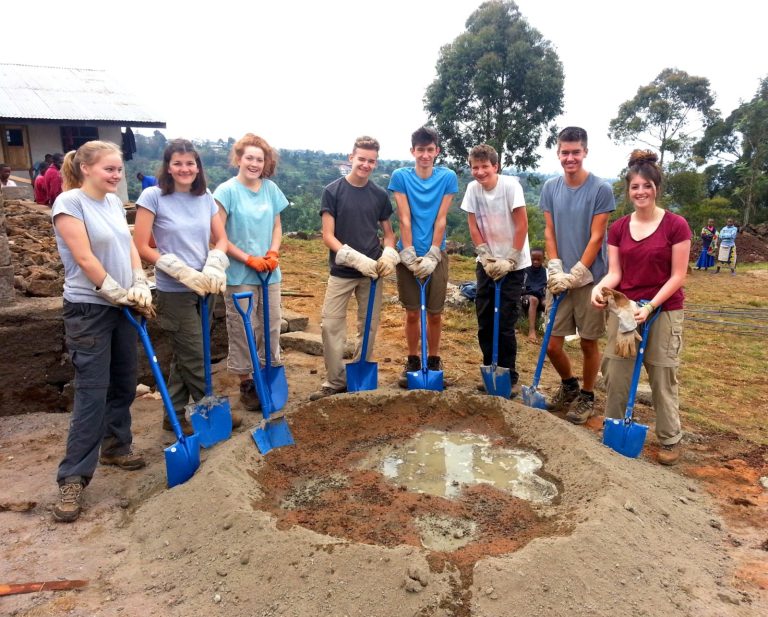
Support Moving Mountains
Other Projects You Might Be Interested In
